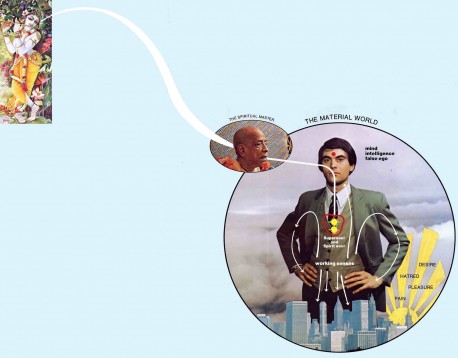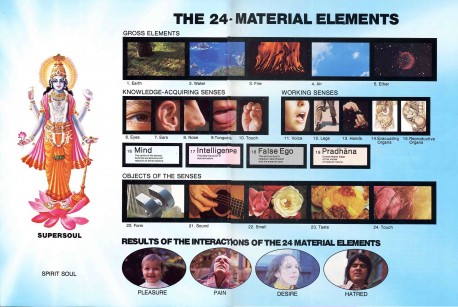by Visakha-devi dasi
In the Thirteenth Chapter of Bhagavad-gita, Arjuna, the perfect student, requested Krishna, the perfect teacher, to present a detailed analysis of the phenomenal world. Such a study of material nature, for the purpose of distinguishing matter from spirit, is known as Sankhya philosophy. The Lord replied to Arjuna’s request by briefly explaining the twenty-four material elements (illustrated on the following pages) that comprise the material world. These elements are Krishna’s external, or inferior, energy, but they exist eternally in some form or another. We find ourselves now in a temporary combination of these material elements called the material world, which, by the arrangement of the Lord, is complete in itself because these elements provide the complete resources for its existence and maintenance. Therefore by studying these elements, one can understand himself, his body, the world in which he lives and the relationship between the three. Gradually one can learn to distinguish oneself, as superior, spiritual energy, from the inferior, material energy. And one can scientifically realize that the original source of both these energies is the Supreme Personality of Godhead, Lord Sri Krishna. When our consciousness returns to its original purity, we can understand all these very clearly.
Our vision now, however, is clouded by false ego, which is the basic principle of material existence. False ego means the acceptance of the body to be oneself. Thus our bodily designations, such as American, Russian, black, white, Christian, Hindu, man, woman, fat, thin, stupid and intelligent, are manifestations of false ego. Our real ego is spiritual, for we are tiny spiritual parts of the supreme living entity, Krishna. Since we are actually spiritual souls, our only connection with our material bodies and minds is that we dwell within them for fifty or a hundred years. Bhagavad-gita therefore compares the gross or visible body to a coat, and it compares the subtle body—consisting of mind and intelligence—to a shirt. The person within, however, is different from the bodily shirt and coat. His misidentification with this body is called false ego. And in the illusion created by false ego, one thinks that by material arrangements and plans he will become happy.
We can understand to some extent that the body we have is a symptom of our desires and activities. That is why we can tell so much about a person simply by looking at him. As it is said, the face is the index of the mind. We have forgotten, however, that before we had this body we had another body, and we do not know that when this present body is finished we will be forced to accept another. In other words, our present body and activities reflect our previous body and activities and give the background for the next. The man who likes to eat without discrimination may attain the body of a hog, for hogs eat anything and everything. One who has fixed his consciousness on godly qualities will change to the form of a demigod. And one who is Krishna conscious will be transferred to Krishna’s abode in the spiritual world to associate with the Supreme Lord. Thus, at the time of death the consciousness we have created will carry us to our next body.
We may ask, who knows my consciousness at the time of death? Who is to say what future body I deserve? Krishna knows. An expansion of the Supreme Personality of Godhead lives in the heart with the spiritual soul, just as one friend sits with another. One friend, the soul, is trying to enjoy life by gratifying his senses. The other friend, however, the Supersoul, is simply watching, for He is the transcendental witness, overseer, permitter and supreme enjoyer. He is the constant companion and the most dear friend of every conditioned soul because it is He only who fulfills our desires, both in this life and in the next. As we may smell the aroma of a rose by being near it, so Krishna, as the Supersoul in the heart, knows exactly what we want, and in due course (even though it may not be the best for us and even though He may not want to give it to us), He rewards us with a body just suited to our desires.
This science of the transmigration of the soul is yet unknown to material scientists, although Lord Krishna, the Supreme Personality of Godhead, has presented it authoritatively and practically in Bhagavad-gita and although great teachers and saintly persons have accepted it throughout the ages. Krishna says, “The living entity in the material world carries his different conceptions of life from one body to another as the air carries aromas.” (Bg. 15.8) Air, being subtle, cannot be contaminated, but it may carry fair or foul odors. Similarly, the spiritual soul is completely, pure; it is eternal, full of bliss and knowledge, and it cannot be materially contaminated. It does, however, carry our material desires, which force us to accept one body after another in this material world to fulfill those desires.

Lord Krishna continues, “The living entity, thus taking another gross body, obtains a certain type of ear, tongue, nose and sense of touch, which are grouped about the mind. He thus enjoys a particular set of sense objects.” (Bg. 15.9) The five knowledge-acquiring senses (the eyes, ears, nose, tongue and touch) and the five working senses (the voice, legs, hands, evacuating organs and reproductive organs) seek and interact with the five objects of the senses (form, sound, smell, taste and touch), under the direction of the mind. This interaction produces desire, hatred, pleasure or pain, depending on how each set of senses responds to its objects. Thus we can understand why one man’s food is another’s poison; why we are repelled by stool, for example, which for the hog is a sought-after meal. The example of Arjuna shows how bodily relationships (which are also material interactions) cause material perplexity. Because of bodily and mental relationships, Arjuna was averse to fighting his kinsmen in the Battle of Kuruksetra. Krishna therefore spoke Bhagavad-gita to teach Arjuna (and ourselves as well) the highest criterion of happiness, transcendental to the relative and flickering actions and reactions of the twenty-four material elements.
The Lord said, “The living entities in this conditioned world are My eternal, fragmental parts. Due to conditioned life, they are struggling very hard with the six senses, which include the mind.” (Bg. 15.7) Although the soul is always pure, it comes under the control of nature when trapped within a material body because the body, being composed of the twenty-four material elements, acts according to the laws of nature, which govern those elements. The embodied living entity has no power to change those laws. Suppose he is put into the body of a dog. He must then act like a dog; he must bark with his vocal cords, he must eat food suitable for a dog, he must raise his leg in a certain way, and so on. In the same way, human beings, under the dictation of the mind, are also forced by the laws of nature to accept or reject different sense objects. The difference between animals and humans is that we have higher intelligence, enabling us to understand who we are—that we are actually not material but spiritual entities and that as spiritual souls we can be liberated from our embarrassing position in this material world when we wholeheartedly accept and follow the process given to us by bona fide spiritual authorities. That is the sum and substance of the Krishna consciousness philosophy. Krishna Himself says, “This divine energy of Mine [the material energy] is difficult to overcome. But those who have surrendered unto Me can easily cross beyond it.” (Bg. 7.14)
Krishna, the Supreme Lord, can be compared to a king, for as a king, being the lawmaker, is beyond all the laws in his kingdom and even has the power to pardon prisoners, so Krishna, the cause of all causes, is beyond the control of nature, and His devotee, who by His grace has understood His glories, is freed from material control. Such a devotee feels full in himself and is callous to material happiness or distress. He is liberated from the urges of the mind and senses. A person in such transcendental consciousness still has desires, he still accepts and rejects, but he accepts anything favorable and rejects anything unfavorable for the execution of devotional service. He has no interest separate from that of the Lord.
To become free from the influence of material energy, we have to change our consciousness. How? Krishna says:
man-mana bhava mad-bhakto
mad-yaji mam namaskuru
mam evaisyasi yuktvaivam
atmanam mat-parayanah
“Engage your mind always in thinking of Me and become My devotee. Offer obeisances and worship Me. Being completely absorbed in Me, surely you will come to Me.” (Bg. 9.34) Thus we can liberate ourselves from repeated births and deaths by learning how to control our minds so that we become absorbed in Krishna consciousness. The mind is always engaged in some kind of thought, but one’s thoughts will be restricted to the actions and reactions of the twenty-four material elements unless and until one engages in spiritual hearing and spiritual chanting, following the example of a bona fide teacher Factually the whole material creation consists only of different names for the material elements and has no more significance than the babble of sea waves. The only links we have with the real, spiritual world are God’s representatives who throughout the ages have passed down His confidential, transcendental knowledge, without whimsically changing it. When our thoughts connect with this spiritual line, they will transcend material qualities, and we will then be able to overcome the laws of nature. Otherwise not.
In trying to satisfy their illusory desires, which spring from the interactions of the elements, materialists remain bound by the stringent laws of material nature as if by iron chains. They do not know that the material sciences in which they take shelter deal only with the gross elements and the objects of the senses, and nothing more.
Philosophers and psychologists who study mental activities also have only fragmental knowledge because they do not know the ultimate source, Krishna. “The foolish cannot understand how a living entity can quit his body, nor can they understand what sort of body he enjoys under the spell of the modes of nature,” the Lord says in the Gita. “But one whose eyes are trained in knowledge can see all this.” (Bg. 15.10) Srila Prabhupada comments on this verse: “Every living entity is quitting his body under certain circumstances and enjoying under certain circumstances under the spell of material nature. As a result, he is suffering different kinds of happiness and distress, under the illusion of sense enjoyment. Persons who are everlastingly fooled by lust and desire lose all power of understanding their change of body and their stay in a particular body. They cannot comprehend it. Those who have developed spiritual knowledge, however, can see that the spirit is different from the body and is changing its body and enjoying in different ways. A person in knowledge can understand how the conditioned living entity is suffering in this material existence. Therefore those who are highly developed in Krishna consciousness try their best to give this knowledge to the people in general, for their conditional life is very much troublesome. They should come out of it and be Krishna conscious and liberate themselves to transfer to the spiritual world.”



Leave a Reply